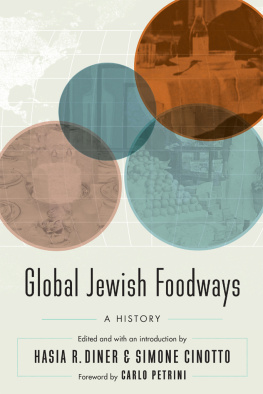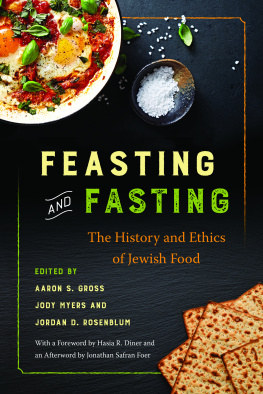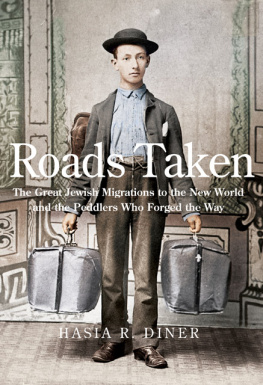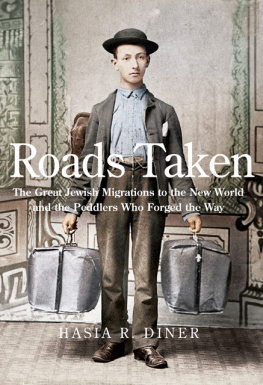Hasia R. Diner - Global Jewish Foodways
Here you can read online Hasia R. Diner - Global Jewish Foodways full text of the book (entire story) in english for free. Download pdf and epub, get meaning, cover and reviews about this ebook. year: 2020, publisher: Nebraska, genre: Home and family. Description of the work, (preface) as well as reviews are available. Best literature library LitArk.com created for fans of good reading and offers a wide selection of genres:
Romance novel
Science fiction
Adventure
Detective
Science
History
Home and family
Prose
Art
Politics
Computer
Non-fiction
Religion
Business
Children
Humor
Choose a favorite category and find really read worthwhile books. Enjoy immersion in the world of imagination, feel the emotions of the characters or learn something new for yourself, make an fascinating discovery.
- Book:Global Jewish Foodways
- Author:
- Publisher:Nebraska
- Genre:
- Year:2020
- Rating:5 / 5
- Favourites:Add to favourites
- Your mark:
- 100
- 1
- 2
- 3
- 4
- 5
Global Jewish Foodways: summary, description and annotation
We offer to read an annotation, description, summary or preface (depends on what the author of the book "Global Jewish Foodways" wrote himself). If you haven't found the necessary information about the book — write in the comments, we will try to find it.
Global Jewish Foodways — read online for free the complete book (whole text) full work
Below is the text of the book, divided by pages. System saving the place of the last page read, allows you to conveniently read the book "Global Jewish Foodways" online for free, without having to search again every time where you left off. Put a bookmark, and you can go to the page where you finished reading at any time.
Font size:
Interval:
Bookmark:




2018 by the Board of Regents of the University of Nebraska
Acknowledgments for the use of copyrighted material appear on page 317, which constitutes an extension of the copyright page.
All rights reserved
Library of Congress
Cataloging-in-Publication Data
Names: Diner, Hasia R., editor.
| Cinotto, Simone, editor.
Title: Global Jewish foodways: a history
/ edited and with an introduction by
Hasia R. Diner and Simone Cinotto;
foreword by Carlo Petrini.
Description: Lincoln: University of Nebraska
Press, [2018] | Series: At Table | Includes
bibliographical references and index.
Identifiers: LCCN 2017026973 (print)
LCCN 2017027895 (ebook)
ISBN 9781496206091 (epub) ISBN 9781496206107 (mobi)
ISBN 9781496206114 (pdf)
ISBN 9781496202284 (cloth: alk. paper)
ISBN 9781496213938 (paper: alk. paper)
Subjects: LCSH : JewsFoodHistory.
Jewish cookingHistory.
Classification: LCC TX 724 (ebook)
LCC TX 724 . G 635 2018 (print)
DDC 641.5/676dc23
LC record available at
https://lccn.loc.gov/2017026973
Set in Merope by Mikala R. Kolander.
Designed by N. Putens.
The publisher does not have any control over and does not assume any responsibility for author or third-party websites or their content.
ILLUSTRATIONS
FOREWORD
CARLO PETRINI
In any culture, in any civilization, in any historical or geographical context, food always serves as a source of identity, community, and sociability. Food mediates with the divine, functions as a bridge across or as a wall between social classes, and provides a way to structure economic transactions. Of course it makes for a celebration of joy and must be present at rites of passage in the life cycle. While true in all cases, some cultures and some peoples place greater emphasis, sanctity, and importance on food, because historical circumstances forced them to do so. In some historical and cultural contexts food emerged as central to their narratives of identity and spirituality. In this, perhaps, no other group can compare to the Jewish people. Jewish Global Foodways: A History makes this point in a compelling manner.
The product of rigorous research, this book also proves to be a pleasure to read, as it traces the relationship between Jews and food, and the functions and meanings food had during the major turning points in their history, as they faced many different diasporas and migrations, wars, and their search for new lands, including the formation of the Jewish state in Israel.
This book offers fascinating food stories as it engages such overarching themes as travel, movement, and exile in modern Jewish history.Because of the turbulent and complex historical circumstances and suffering that Jews confronted in so many places, these issues have constituted their common heritage and have helped them shape their mobile identities, loosened from any one land, giving them a wide and ever changing geopolitical context. Because of this, food has had a vital role in reinforcing feelings of identity and community and providing narratives of affiliation, solidarity, and uniqueness. Acknowledging all these common themes that transcend time and place does not, however, mean that one can overlook the differences that also affected, modified, and shaped Jewish identity and food culture.
Editors Hasia Diner and Simone Cinotto have produced here a highly valuable work, which offers much food for thought as it embraces different and interconnected dimensions of Jewish food history, such as culture, spirituality, rituality, and migration. However, the value of this book is not limited to the excavation of the past, although the past ought to be studied. Today more than ever it is vital to reflect on the value and meaning we assign to food. In our contemporary world, food has rapidly become a mere commodity, evaluated and measured exclusively in terms of price. The declining social value of food can be considered one of the chief defects of our food system, linked to the unprecedented degrees of environmental destruction, social injustice, and waste it promotes. The bulwarks of culture and tradition, which historically created and supported the deep value of food, have likewise been diminished in our own time.
But we cannot afford to dispose of the heritage of experience, tradition, conviviality, and commonality that the worlds peoples have created, articulated, and conveyed through food. On the contrary, this legacy has to be preserved, rediscovered, and understood. The essays included in this collection are important exactly because they are very useful contributions to the decodification and interpretation of the history of the relationship between Jews and food. Enjoy the read.
ACKNOWLEDGMENTS
My first thanks go to Simone Cinotto, a world-class scholar of food and migration and a world-class colleague, whose enthusiasm, hard work, and dedication made this volume possible. The volume grew out of a conference, and his cheerful and diligent attention to detail enabled scholars to gather in a beautiful space in Pollenzo, Italy, to hear the papers, exchange ideas, talk with each other, and yes, eat well. The logistics of the conference and its ensuing book also needed the labor of the staff of the Department of Hebrew and Judaic Studies at New York University who handled the welter of logistics with grace and competence. Finally, Alex Goren and the Goldstein-Goren Foundation provided most of the funding for the conference, and without the funding, we would have had no chance to meet, learn, and then share with each other. We thank him deeply.
HASIA DINER
It is indeed a distinct privilege to end up closely collaborating with someone you have admired for very long through the medium of her books and conference presentations! I thank Hasia Diner for the opportunity she granted me to help organize the joint conference on The Global History on Jewish Food held in Pollenzo, Italy, in 2014, during which the idea of this book first materialized. Together we were able to gather first-rate scholars and their essays on the topic. Working with Hasia to edit this volume has also been a valuable, delightful, and fun experience from day one to the end. For their enthusiastic support of the original conference, I thank the president, Carlo Petrini, along with my colleagues, the staff, and the students of the Universit di Scienze Gastronomiche Pollenzo. Exploring Jewish foodways from differents cholarly perspectives and in different times and places has been tremendously enriching for my research interests in the history of food, migration, and diasporas; the history of consumer culture and ethnicity;and the history of taste. For this, I want to thank all the contributors to this volume, who entrusted us with their essays and intellectual efforts.Finally, I have finished my share of the editorial work on this book, and I am writing these notes, while spending the winter holidays with my children Ferdinando and Cristina. With their wittiness, humor, and love they made my work even more gratifying and one more time gave real sense to what sociologists of the family sometimes call quality time.
Font size:
Interval:
Bookmark:
Similar books «Global Jewish Foodways»
Look at similar books to Global Jewish Foodways. We have selected literature similar in name and meaning in the hope of providing readers with more options to find new, interesting, not yet read works.
Discussion, reviews of the book Global Jewish Foodways and just readers' own opinions. Leave your comments, write what you think about the work, its meaning or the main characters. Specify what exactly you liked and what you didn't like, and why you think so.






